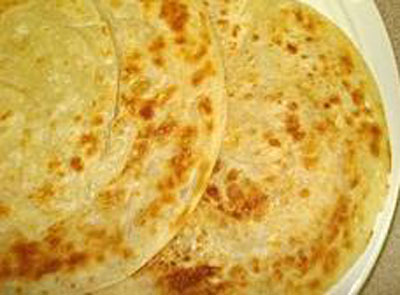INGREDIENTS REQUIRED:
For dough:
1 small or 500 gm lauki or dudhi
1 1/2 cup or 150 gm. chapatti flour
1 1/2 cup or 200 gm. millet or bajra/bajri flour
1/4 cup or 35 gm. chapatti flour on a plate for dusting, to be used during rolling out
3-4 green chillies, very finely chopped
1 inch piece ginger, peeled and finely grated
1 small bunch of coriander leaves, cleaned and chopped or a bunch of fenugreek/methi leaves chopped.
Salt to taste
1 tsp. turmeric powder
Yoghurt, as required. You may need a tbsp. or two.
Oil for pan frying
Instructions:
1.
Making dough:
2.
Peel and grate lauki/dudhi. Squeeze out water by pressing lightly between both palms. save the water, you may need it to make dough. It is better to remove it initially and add later, because lauki has too much water and you may end up with very runny dough if you don't.
3.
Place all ingredients except yoghurt in a bowl and make firm dough. If necessary, add saved lauki water. If it is still too firm, add 1 tbsp. yoghurt at a time while kneading.
4.
Knead well and keep aside for 10 minutes or so.
5.
Rolling out parathas:
6.
Break dough into 14-16 portions and roll them into balls, using a little dry flour to dust. Keep them covered with a moist cloth. Roll out the one paratha at a time, while the previous one is cooking, as follows; dip one ball in dry flour kept on a plate and then roll it out to 3-3 inches 6-7 cm circle/disc.
7.
Place 1/8 tsp. (a few drops) of oil in the centre of this circle, pull the edges in and seal it in the centre. Now you have a ball again.
8.
Heat a griddle or tava.
9.
Flatten the ball by hand and then roll it out into a pancake like circle, 5-6 inches or 14-15 cm. in diameter. It should be rolled out from centre outwards, so that the edges are thinner than the centre. You will need to dust a couple of times, by rolling it in dry flour. Parathas should not be too thin, approximately 2-3 mm thick, as very thin ones do not have a 'bite'.
10.
Put the paratha on the hot griddle. Turn it over when it changes colour to semi-translucent and you can see a few blisters on the under-surface.
11.
Cook the other side same way and turn over again.
12.
Brush a little oil on both surfaces, one by one. This can be done with a small ladle or a soup spoon.
13.
Press it gently all over, using a flat spatula, coaxing it to fluff up into a ball. If you see any steam escaping, seal it by pressing it with the spatula. This helps the fluffing up of the paratha. If it doesn't, do not worry, just make sure that it is cooked well.
14.
Cook until crisp and nicely browned on both sides.
15.
Serve hot with pickles and tea.
Notes:
These parathas can be made in advance and reheated on a griddle/tava or in a microwave.









.JPG)


















.JPG)
















.jpg)

.JPG)

